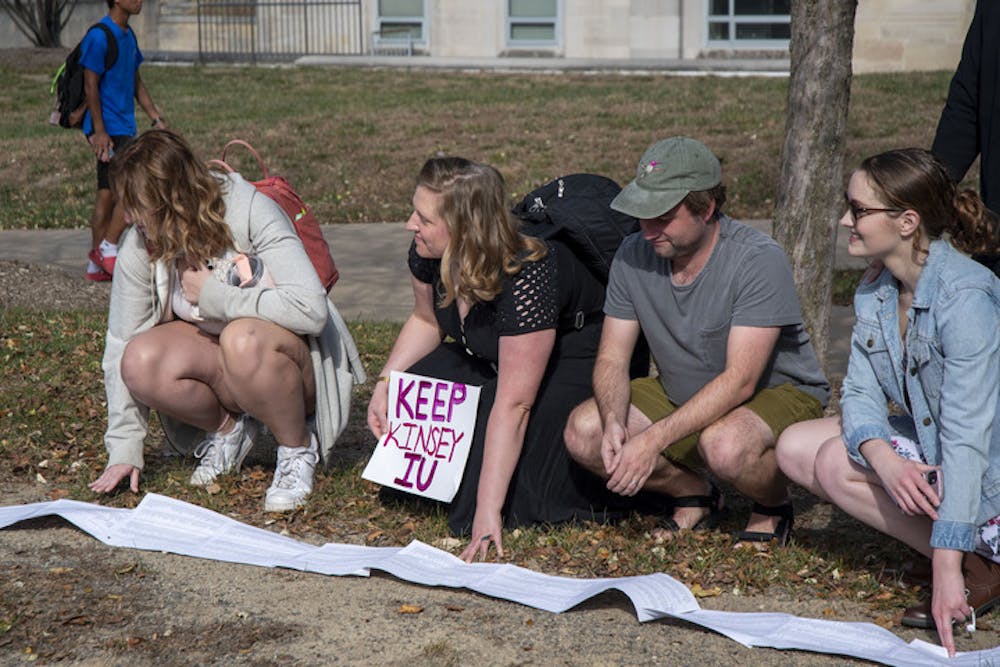IU faculty, staff and students expressed safety and intellectual freedom concerns in the university's third and final public listening session Jan. 19 regarding the future of the Kinsey Institute for Research in Sex, Gender and Reproduction.
Established in 1947, the Kinsey Institute is a leading research institute on sexuality, gender and relationships, containing one of the largest sexological collections in the world. Last year, the Indiana General Assembly passed a budget that prohibited the use of state funds for IU’s Kinsey Institute, with Rep. Lorissa Sweet, R-Wabash alleging without evidence that the organization could be harboring child predators. Since the decision, the fate of the organization and its collections has been uncertain.
The IU Board of Trustees discussed a potential plan to divorce the institute from the university and establish it as a nonprofit at its November meeting, generating backlash from the institute’s staff, IU students and other community members. Those concerned said they didn’t like the short notice before the matter was brought before the board and the plan’s aspect of separating the collections from Kinsey and housing them at the university.
While the Board of Trustees tabled the topic in November, it will still have the final say over the creation of a nonprofit. Kinsey Executive Director Justin Garcia said at the session the ultimate decision on how to achieve compliance with the new law rests with IU President Pamela Whitten.
Garcia said Trustee Quinn Buckner suggested a working group to assist the university in developing a solution to the funding issues introduced by the law. In addition to Garcia, the working group includes Vice Provost for Finance and Administration Aimee Heter, University Controller Anna Jensen, Peggy Maschino, senior associate director for operations and finance, Daniel Morris, associate vice president of development, Kinsey Research Director Stephanie Sanders, April Sellers, Director of the Kinsey-Kelley Center, Mike Shumate, a member of the Kinsey Institute International Advisory Council and Kinsey Head Librarian Liana Zhou.
At the beginning of Friday’s listening session in the IMU Dogwood Room, Garcia outlined the university’s task of achieving compliance with the law by the end of the fiscal year, which is June 30 for both IU and the state of Indiana.
“The bottom line is that we are under threat,” he said.
While work must be done and decisions must be made before the deadline, Garcia said Provost Rahul Shrivastav, who attended the Wednesday session, has been listening to concerns. Ultimately, the fate of Kinsey is larger than the institute itself, involving a broader right to study human diversity, particularly concerning the LGBTQ+ community, Garcia said.
Heter said IU has not considered dismantling or defunding the institute — a commitment she promised would not change.
The first to speak Friday was English professor Judith Brown, who said the first strategy of those who seek to destroy something is to weaken it. If this is not the intention with the Kinsey Institute, Brown said, then that is what it seems like from an outside perspective.
“IU and the phrase ‘academic freedom’ is publicly the most Googled phrase right now,” she said.
Brown also reflected on past IU leaders, including former president Herman B Wells and chancellor Ken Gros Louis, who each openly supported and defended the institute despite intense controversy.
Dev Montanez, office coordinator at the institute, said harassment directed at the institute makes her feel unsafe, a feeling that is exacerbated by IU Police Department presence near Lindley Hall. IUPD was also present outside of the listening session.
Instead, Montanez said IU should be more proactive and outspoken in their defense of the institute. She also said moving the organization off-campus under a potential nonprofit plan would make her feel less safe.
Katie Webber, an archivist at the institute, said Kinsey has accumulated such a large collection partly because many people fear their home institutions will not be able to protect it. She said the institute may face future restrictions from the legislature, such as a potential ban on explicit material.
Other concerns included student researchers and Kinsey staff who chose to attend IU because of the institute despite its location in Indiana, which they described as rural or hostile to issues like reproductive rights. Some said they feared Indiana legislation would only become increasingly oppressive toward the institute.




